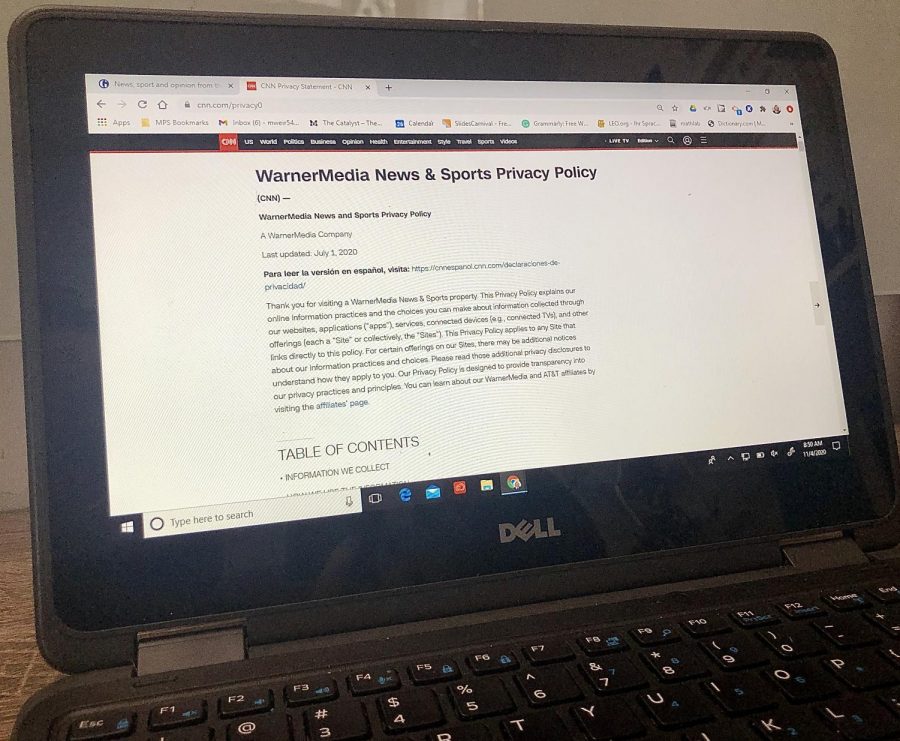Teens need to care about data privacy
The right to our personal information is at stake
According to an analysis by the New York Times, CNN’s privacy policy has a Lexile score of over 1600, meaning that it would be a difficult read even for those in professional fields like law and medicine. Hulu, Airbnb, Zoom and Disney have similarly difficult policies with Lexile scores of over 1500.
November 6, 2020
As you go to enter a website, a pop-up jumps on screen. A link to the site’s privacy policy comes up. If you’re like 91% of Americans, you mindlessly hit the agree button and move on without a second thought. Many of us assume this choice has no real consequences, that it’s just an annoying formality. We don’t think we should care that much about our data privacy.
We should.
One reason people don’t care about the lack of data privacy is because many don’t fully understand it. Most people are aware, and unbothered, that websites collect information on things like what we buy online or what age demographic we are. They don’t understand that the breadth of information that is collected and stored is so much larger and more invasive than that. How long you look at a picture for, how fast you type on your keyboard, the geolocation of the photos you take, your biometric information—all of it is captured and stored.
That data is valuable to businesses. In 2018, US companies spent a total of 19 billion dollars to obtain and interpret our data. It should be valuable to us, too. In an increasingly digital world, our data contains our identity. It holds our most sensitive information, private interactions and personalities. The fight for data protections is, fundamentally, a fight to protect our most basic rights and safeguard our personal information against the interest of tech giants who make billions selling our data at the cost of our privacy.
Many people brush off the threat of invasive data collection, believing that they shouldn’t care because they have “nothing to hide.” While you may not have inappropriate or illegal activity within your data, there is still loads of sensitive information: bank accounts, health details, text messages, geographic location and more. Besides that, we all have a reasonable right to privacy, regardless of what we do or do not have to hide.
The issue of data privacy has long been overshadowed by other issues, especially among teens. Our generation is facing the ticking clock of the climate crisis, growing national college debt and an intensifying mental health epidemic. Data privacy is far down on the list of things that we prioritize. In fact, it rarely crosses most teens’ minds. This is simply the world our generation was born into. We are the “iGeneration,” the group of people who had social media in middle school, who have had internet access our whole life. Now that we are finally seeing the long-term impacts and risks of this technology, we need to ask what role we want it to play and where we want to set its limits.
Much like we expect that government and businesses don’t rummage through our closet or search our car, we should be able to expect that our sensitive data is not collected, sold and used. We have a right to our own data: to protect it, to access it, to delete it. We have a right to know who is collecting our data, what information is being collected and how it is being used. Privacy policies, in theory, should provide these answers for us, but they are often unreadable to college-educated adults, much less high schoolers. After reading through 150 different privacy policies, the New York Times found that most policies take upwards of 15 minutes to read and are filled with nearly incomprehensible legal terms. These policies, as the consulting director of privacy at the Stanford Center for Internet and Society, Albert Gidari, noted, trick us into thinking they “are there to inform users, as opposed to protect companies.” True data privacy requires transparency, and true transparency requires accessibility—or, at the very least, readable privacy policies.
Currently, a lot of our data is being sold to businesses and used for targeted product advertising. However, the past few years have shown that data collection may be moving in a scary new direction: selling data to political campaigns who use it for targeted political ads. There is no better example of that than the Cambridge Analytica scandal. The Cambridge Analytica firm, which was hired by Donald Trump’s campaign in 2016, bought data on Facebook users and created highly specific user profiles that categorized peoples’ personalities based on their data. One category of users, labeled “persuadables,” was sent targeted ads that attempted to convince people to vote for presidential candidate Donald Trump and attacked his running mate, Hillary Clinton. Political ads have been a central part of elections for much of American history, but there has never been a time where data collection was as sophisticated and invasive as it is today. There has never been a time where politicians could buy mass amounts of our information to manipulate us and engage in what Cambridge Analytica’s whistleblower referred to as “psychological warfare.” If Cambridge Analytica was any indication of how data will be weaponized by politicians in the future, our democracy is at stake.
During this election (and every coming election for the foreseeable future), we’re voting on data privacy. On the ballot in Michigan, for example, is a proposed amendment to require a warrant from law enforcement before they seize data. In California, a more controversial proposition known as Prop 24 seeks to take the state’s current California Consumer Protection Act further by requiring more permissions from users in order to collect certain data. Critics have said that this would encourage “pay for privacy schemes,” where sites offer discounts and financial incentives to users in exchange for data. These schemes heavily impact the lower class and exacerbate already existing inequalities within data collection. The critical issue of data privacy has been overshadowed this election cycle, as it often is, by a profusion of other issues. Hopefully, as today’s high schoolers reach voting age, data protections laws will get more attention during elections.
We need to advocate for our own futures and our own rights because the companies making billions off our data will not advocate for people, much less for teens. With limited regulation and competition in a monopolized tech industry, no one is protecting our data. The laws in place need to be more expansive, more heavily enforced and more radical. As our generation becomes a larger percentage of the voting cohort, we need to make those demands.
We should care about our privacy. Because this isn’t really just about data—it’s about democracy, justice and liberty. This is about who has power in our society and how they use our information to strengthen their power.







